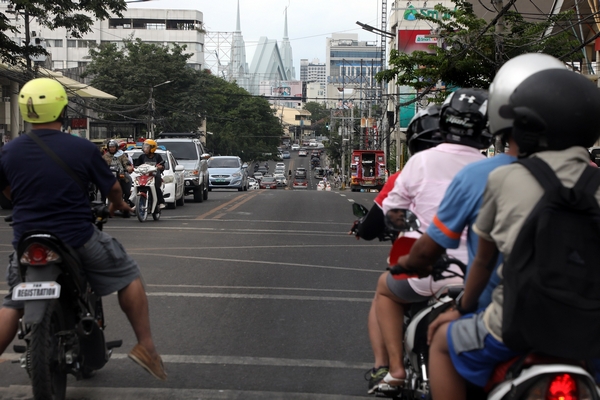
Traffic woes are expected along Cebu City’s main thoroughfares when private schools open today, a week after public schools open for the school year 2018 to 2019. CDN PHOTO/TONEE DESPOJO
Carme Lou Magto is all set for the start for another school year today.
But apparently, she will have to brace not only for new lessons but also for another wave of traffic gridlocks, with thousands of students hitting the road as most private schools open classes today.
Magto, 19, allocates at least two hours for her travel time from their house in Naga City, a southern suburban city, to catch her first subject at 9 a.m. in a university in the downtown area of Cebu City, 21.7 kilometers from her hometown.
Cebu City Transportation Office (CCTO) Chief Francisco Ouano advised commuters on Sunday to brace for possible traffic gridlocks on the city’s roads.
Ouano identified the Gov. Cuenco Avenue in Banilad to Talamban area in the northern part of the city, and the Barangay Mambaling part of N. Bacalso Avenue, Cebu City’s southern gateway to the south, as major traffic choke points.
“Expected gyud na nato nga mo-worsen ang atong traffic. Fortunately, duna gyud tay mga personnel nga gipang deploy. Ato gihapon nang gipangitaan og paagi nga visible all possible times ang atong mga traffic enforcers,” Ouano said.
(It is expected that traffic will worsen. Fortunately, we have personnel to deploy. We will find ways to ensure that our traffic enforcers will remain visible at all possible times.)
Round-the-clock shifts
Ouano said that all the 278 traffic personnel of the CCTO will be deployed in three shifts: 6 a.m. to 2 p.m., 2 p.m. to 10 p.m., and 10 p.m. to 6 a.m. to ensure that problematic areas will be taken care of.
There are two big universities that lie in Gov. Cuenco Avenue in Banilad and Talamban, while most students from the southern part of Cebu traverse through N. Bacalso Avenue in going to the heart of the city where most colleges and universities are located.
“Dapat mo sayo siguro ta sa eskwelahan o trabahoan para di kaayo ta ma-caught up sa traffic. We know nga Monday pa gyud, daghan gyud kaayo mosulod sa skwela or trabahoan,” Ouano advised.
(It is a must that commuters should leave for school or work early so that they will not be caught up in traffic. It’s a Monday and many are heading for school and work.)
In the Banilad-Talamban areas, Ouano said that one contributor to the heavy traffic flow is the lack of functional traffic lights.
He said that they have already requested the city government for the procurement of more traffic lights.
Ouano said they have wanted to install more traffic lights but this project has not been included in previous budgets.
The city’s existing traffic lights were mostly installed in the 1990s, some of which would not usually work when there is a heavy downpour.
“Hopefully, ma apil na sya sa (this can be included in the) budget,” Ouano said.
Car volume from the north
Another cause of traffic jams, he said, is the large volume of vehicles from Mandaue City and Consolacion, two of the most densely populated areas in northern Cebu, that converge at the Banilad-Talamban area.
Ouano added that an ongoing road repair near a private school in Talamban is also contributing to the traffic situation.
“We already gave a warning to the contractor because of their delay. They should have started working in summer and end this August but (they replaced their) engineer,” Ouano said.
Ouano said they told the contractor that their decision to change their engineer should not be the city government’s concern. What is important, he said, is that they should hamper traffic in the area.
According to Ouano, about 2,000 vehicles are expected to ply the road heading to the private school in the area.
Mambaling underpass construction in the south
In the south, Ouano said that a traffic gridlock is also expected due to the ongoing construction of the P638-million underpass project at the intersection of N. Bacalso Avenue and F. Llamas Street in Barangay Mambaling.
Roy Dela Cruz, the underpass project engineer, announced on Friday that they have already completed the third phase, or 75 percent of the project.
In about two weeks, the south bound lane of N. Bacalso Avenue will be reopened while the city bound-side of the streets will be closed for Phase 4 of the project.
Ouano said that they are now crafting a new traffic plan for city-bound vehicles, which will be implemented once the city-bound lanes will be closed.
Car pooling in Mandaue
In Mandaue City, Traffic Enforcement Agency of Mandaue (TEAM) Chief Glenn Antigua also advised the motorists to share rides to minimize the volume of vehicles plying the road.
Antigua said that they would be deploying more traffic enforcers at identified chokepoint areas, such as the intersection of U.N. Avenue and M.C. Briones Street, and the roads leading to big schools in the city.
Antigua added that all their 200 personnel will be deployed in two shifts, 6 a.m. to 2 p.m. and from 2 p.m. to 10 p.m..
Meanwhile, Senior Supt. Joel Doria, Cebu City Police Office (CCPO) chief, assured that their security measures are all in place for the opening of classes of most private institutions today.
Doria said that while police officers will not be allowed to get inside some private schools, they are still directed to monitor the schools’ vicinities.
Station commanders are also directed to assign a traffic management group to help in manning the traffic at chokepoints. /WITH CORRESPONDENT BENJIE B. TALISIC